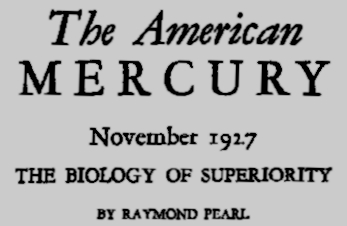Ain't I witty? And know what, too? Bill Clinton's a
rapist! But that's about something in his jeans, not his genes! HA! MAN that was good! Whew! Y'know...sometimes I just
think funny things... Okay, argument's over! Liberals are proven to be idiots or evil or both through juvenile humor. "Everyone can go home now. Drive safe," as
James Lileks would say.
Seriously, though…as a service to you, gentle readers (both of you), I have abused my access to the finest research library in the region and obtained the article in question. I even read the thing. I
even understood a bit of it (but don't expect too much from a Chimp-loving intellectual Neanderthal like me…)
"The extent to which attitudes and behaviors have a genetic component" is approximated and analyzed in the study by comparing monozygotic (MZ; "identical") twins' subjective reactions to certain phrases with political overtones with those of dizygotic (DZ; fraternal) twins. The two groups have significant differences in genetic similarity (MZ, 100%; DZ, 50% on average), but are widely presumed to grow up in basically similar environments (and even when they don't, correlation between MZ twins may itself be revealing). So, logically, comparing the degree of correlation between MZ and DZ twins on political questions should yield information on how much political attitudes are inherited: equivalent correlations would support "nurture versus nature;" big differences in correlation between the two groups would support "nature versus nurture." The researchers determined that correlations did differ significantly and therefore concluded that there's a substantial genetic component to political belief. The differences were most pronounced "for the overall index of political conservatism," where "genetics accounts for approximately half the variance in ideology, while shared environment including parental influence accounts for only 11%." ("And therefore…?" "She's a witch! BURN HER!!")

Some of this makes sense. It seems reasonable to acknowledge a genetic component in many things, from golf swings to preference in kool-aid flavors. Of course, these things are correlated to physical characteristics, which are clearly heritable. Intuitively, the correlation to political opinions seems much more tenuous, since genetics only
determines physical structures. "Behavioral geneticists," as the researchers call themselves, must then posit some connection to physical structures (as of the mind) that can be determined by genetic mechanisms. In this study, the researchers postulate two opposing "phenotypes" "for purposes of illustration" that are, presumably, hard-wired into us. Here is where their logic begins to break down.
 First
First, there's reason to have some qualms about the researchers' methodology on scientific grounds.
Neuroconservative admirably summarizes my own objections to the bases of the study:
So, the sticky wicket is the interpretation. The authors use a mathematical approach to defining heritability that has been widely-used in behavioral genetics (though never before in political science per se), but is very controversial philosophically and is prone to misinterpretation. In a nutshell, the mathematics superficially ascribe discrete packets of causality (percentages of variance explained) to genes, shared (familial) environment, and external events (unshared environment). Yet it is a fundamental philosophical error to reify these constructs, and a whopping scientific error to ignore the centrality of interaction effects. Any of these potential subtleties are, predictably, almost completely lost on the hapless NYT reporter.
Neuroconservative hits the central point toward the end there. Humans are complex adaptive systems, which means that even in relatively closed and controlled environments, interaction effects are
a) More important in determining macro-level system behavior than are the (essentially static) initial conditions (in this case, the basic genetic sequences) and
b) Non-linear in nature, which means that undetectably small changes in initial or interactive conditions can lead to very large, macro-level changes in system behaviors as the system progresses through time. It also means that system evolution cannot be modeled predictively. As NS says, this is "a whopping scientific error" that fundamentally flaws the validity of the original research (and, unsurprisingly, also catches NYT's reporter, who is clearly sympathetic to the study's conclusions).
 Second
Second, the empirical existence of the two "phenotypes" is questionable, as are the researchers' motives in delineating the groups' characteristics as they did. The first "phenotype"
Is characterized by a relatively strong suspicion of out-groups (e.g., immigrants), a yearning for in-group unity and strong leadership, especially if there is an out-group threat ("Do not question the President while we are at war with terrorists"), a desire for clear, unbending moral and behavior codes (strict constructionists), fondness for swift and severe punishment for violations of this code (the death penalty), a fondness for systematization (procedural due process), a willingness to tolerate inequality (opposition to redistributive policies), and an inherently pessimistic view of human nature (life is, "nasty, brutish, and short").
The second phenotype, on the other hand,
Is characterized by relatively tolerant attitudes toward out-groups, a desire to take a more context-dependent rather than rule-based approach to proper behavior (substantive due process), an inherently optimistic view of human nature (people should be given the benefit of the doubt), a distaste for preset punishments (mitigating circumstances), a preference for group togetherness but not necessarily unity ("We can all get along even though we are quite different"), suspicion of hierarchy, certainty, and strong leadership (flip-flopping is not a character flaw), an aversion to inequality (e.g., support for a graduated income tax), and greater general empathic tendencies (rehabilitate, don't punish).
Ah! NOW we see the violence inherent in the system! Needless to say, the first phenotype corresponds broadly to "political conservatism" and the second to "liberalism," although the researchers name them "absolutist" and "contextualist," respectively.

It doesn't take a rocket scientist to see what's going on here. If the "absolutist" phenotypers sound like Nazis and the "contexualists" sound like light and sweet reason, it's not a coincidence. Look at the general sense of the words, the scare quotes, the buzz-phrases chosen: "absolutists"—full of "suspicion" (bad), "yearning" (pathetic schmucks!), "strong leadership" (like Hitler?), "'do not question…'" (…BushHitlerChimpy), "threat" (paranoid bastards!), "unbending…codes" (well, whaddya expect of a bunch of morons?), "swift and severe punishment for [code] violations" (like Torquemada? Gilles de Rais? (no wait—buggery's okay)), "systematization" (they make the trains run on time), "tolerate inequality" (tolerate it? Hell, they get off on it), "inherently (literally, I guess) pessimistic view" (unlike us people-loving liberals…), "nasty," "brutish"… (they forgot "solitary" and "poor").
And, you guessed it, (us) "contextualists" are "relatively" (good), "tolerant" (real good), "desire" (not a filthy "yeaning," by gum), "more context dependent" (we're so nuanced we make ourselves sick!), "substantive due process" (real good again), "inherently optimistic" (sunshine, light…), "mitigating circumstances" (unlike those fascists), "preference" (nothing dogmatic (bad) here), "togetherness" (Kum-Bi-Yah…), "all get along" (diversity = real real good), "suspicion of hierarchy, certainty, and strong leadership" (we're independent-thinking Americans, unlike those Boobois proles in the RedStates), "aversion to inequality" (WE get off on justice!), "support for a graduated income tax" (who but a complete rube would be against THAT?), "greater general empathic tendencies…"
The authors go on for a page and a half like this. Here's another sample:
Similarly, if a Republican president had committed adultery with a young intern or if a Democratic president had dramatically worsened the deficit…
You mean like Jimmy Carter? No?
…And taken the country to war in a far-off land on the basis of undeniably incorrect beliefs…
Like Lyndon Johnson? Oh….I get it.
…About the opponents'…weapons capabilities, the positions of most voters on the acceptability of these conditions would be completely reversed
Not a bad point—issue positions reflect divisions, they don't create them—but, again, couched in terms that leave little doubt as to the authors' own normative perspective. "Adultery with a young intern" (oh, those boys…ha ha….they
will have their fun!); "dramatically worsened…deficit…took to war…undeniably incorrect beliefs…" (…the freakin' chimp did everything but rip up the Declaration and flush it down the bung hole…)

The article reinforces a point I've made
before: The Uncertainty Principle applies everywhere, not just in subatomic physics. The normative assumptions and focus of the observer guide, suggest to, direct…taint… the act of observing. One can make an honest, conscious effort to remain "objective," but can never entirely succeed. The very framework that defines "objective" and "subjective" is viewer dependent to some extent (to us in the physical cosmos). What's more, as philosophical relativism undermines ideas like natural law or a fixed "human nature," people become more enamored with their own subjective perspectives, less willing to accept the idea of immutable ("absolute," "unbending") rules, and less
able to distinguish between objective and subjective.
Unfortunately for these researchers (and for the left in general), there is a component of human nature that "yearns" for certainty—and tends to impose it if not found, even if that certainty is not strongly grounded in reality. This is true across the political spectrum, I'm afraid, and is not the unique province of one political orientation. Witness the fact that some of the most hard-nosed doctrinaires in American political life are among the most "liberal"—James Carville, Ward Churchill, Howard Dean, Barbara Boxer, Barbara Ehrenreich, Ted Rall, Ted Kennedy, Margaret Cho, Dan Rather, Jane Smiley, Juan Cole, James Woolcott, Janeane Garofolo, Markos Zuniga, The Democratic Underground….need I go on? Yeah, there are righties who are as doctrinaire—Ann Coulter, Newt Gingrich, and Michael Savage come to mind—but that ain't the point. I had no trouble coming up with a dozen or more names of people on the left who are as lock-step as any apparatchik in the MiniTrue off the top of my head. I similarly have no trouble coming up with many who are considered "conservative," but whose views are nuanced and "contextualist" in the sense identified by the study's authors: Benedict XVI (contrary to the press' portrayal of him), John Paul II, Ronald Reagan (yes! Read the description again), Condi Rice, Bernard Lewis, Glenn Reynolds (even though he doesn’t call himself "conservative," the left certainly sees him as one), George F. Will, Antonin Scalia, and Clarence Thomas (also contrary to his press image)—again, just off the top of my head.
That's the irony here: It is quite possible to be a moral and philosophical relativist and yet be an "absolutist" in the way one lives life and approaches opposing people and ideas. (Now that I think of it, Lenin and Hitler come to mind as extreme cases, left and right respectively).

Ultimately, this study just boils down to a simplistic exercise in demonizing the political / cultural opposition using science to mask the attempt. The authors entered their "research" with their conclusions already formed, then sorted and assembled the data to support those conclusions. Of course, that's what many scientists do to some extent in testing hypotheses, but this deductive approach has inherent dangers, and descends to the level of Soviet- or Nazi-like propagandistic junk science when used to bolster or undermine political arguments. And this is ultimately dangerous. Don't think so?
A hundred years ago, I would have worried seriously about the reaction a popular interpretation of biological determinism evinced from the right: "See, I told you: those blacks are just monkeys / Jews are just rats, / Paddies are just rutting pigs / non-Nordics are just mongrels. Can't help it…it's just in their genes. 'Shallow end,' what what? Guess we'll just have to sterilize 'em all." Or even just 30 years ago: Those blacks and Mexicans don't do as well on intelligence tests because IQ is hereditary…and you know what that means…." And here's finally the point:
This was all spurred on by the best "scientific" thinking available at the time.* Such thinking has been used as a justification for engineered breeding programs, forced sterilization, mass abortions, other forms of murder (like lynching), and even genocide.
Today, biological determinism's political polarity has switched, but that's somewhat understandable. A century of failed communist, socialist, and behaviorist experiments to remold mankind using nurture as the only variable have not shaken the "liberal" relativists' holiest of holy dogmas: human nature is malleable. (And the second is like unto it: "It is our holy duty to change that nature for the better." And the Third Dogma is: "we know what "better" means better than anyone else.") "Nurture's" failure to produce the
Ubermensch has, however, discredited it as the prime mechanism for achieving the change. At the same time, advances in genetics have opened up the possibility of rebuilding human nature from its very foundations. Here's where new disciplines like genetic behavioralism become useful. The left has already used its arguments to good effect in trying to convince the public that sexual preference is genetically "determined." The notion of biological determinism is just as likely to be used as a weapon today—spurred on by today's best "science." Warning flags should go up anytime we hear of studies like this, or see them touted as cutting-edge "science" in the popular press.
Monk* I know something about this subject, having a large collection of crackpot pseudo-scientific literature from bygone eras, spanning the entire political spectrum. I shared interest and amusement in fringe belief with a close friend—Fred, "The Brain," now sadly long-since passed—who had a knack for finding things like Madison Grant's Passing of the Great Race (which, amazingly, is still in print), Earnest Albert Hooton's hilarious Apes Men and Morons, Angela Davis' equally-funny If They Come in the Morning (the honkey pig-fuzz, that is), Reich's Greening of America, and anything by Erich Von Daniken. I inherited much of his collection. This didn't represent an unhealthy interest—Fred was African-American and very liberal—but he loved tearing the arguments apart logically. Great fun.





























